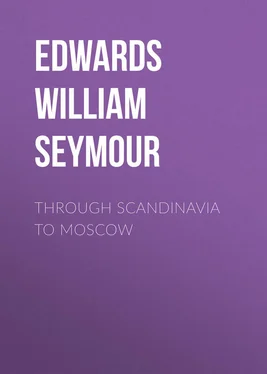William Edwards - Through Scandinavia to Moscow
Здесь есть возможность читать онлайн «William Edwards - Through Scandinavia to Moscow» — ознакомительный отрывок электронной книги совершенно бесплатно, а после прочтения отрывка купить полную версию. В некоторых случаях можно слушать аудио, скачать через торрент в формате fb2 и присутствует краткое содержание. Жанр: foreign_antique, foreign_prose, Путешествия и география, на английском языке. Описание произведения, (предисловие) а так же отзывы посетителей доступны на портале библиотеки ЛибКат.
- Название:Through Scandinavia to Moscow
- Автор:
- Жанр:
- Год:неизвестен
- ISBN:нет данных
- Рейтинг книги:4 / 5. Голосов: 1
-
Избранное:Добавить в избранное
- Отзывы:
-
Ваша оценка:
- 80
- 1
- 2
- 3
- 4
- 5
Through Scandinavia to Moscow: краткое содержание, описание и аннотация
Предлагаем к чтению аннотацию, описание, краткое содержание или предисловие (зависит от того, что написал сам автор книги «Through Scandinavia to Moscow»). Если вы не нашли необходимую информацию о книге — напишите в комментариях, мы постараемся отыскать её.
Through Scandinavia to Moscow — читать онлайн ознакомительный отрывок
Ниже представлен текст книги, разбитый по страницам. Система сохранения места последней прочитанной страницы, позволяет с удобством читать онлайн бесплатно книгу «Through Scandinavia to Moscow», без необходимости каждый раз заново искать на чём Вы остановились. Поставьте закладку, и сможете в любой момент перейти на страницу, на которой закончили чтение.
Интервал:
Закладка:
Our new found friends, when we lunched upon the big ferryboat, introduced us to that very Danish dish called Smoer Broed , thickly buttered rye bread overlaid with raw herring or smoked goose breast, a Viking dainty – a salty appetizer well calculated to make the Norseman quaff from his flagon with more than usual vim, and to drive an American in hurried search of plain water! These salty snacks of cold bread and cold fish are as eagerly devoured and enjoyed by the Scandinavian as are the peppery, stinging eatables for which every Mexican palate yearns.
It was dusk when we arrived in the large and commodious Main station at Copenhagen. The suburbs of the city were hidden from us by the gathering darkness, and the electric lights were glowing when we left the train.
We missed General and Mrs. C at the station, so great was the crowd, but found them when we came to our hotel, the Dagmar, they having themselves missed us and followed on our track.
There are many good hotels in Copenhagen and this is among the larger and more popular stopping places of the Danes themselves. It is built along the clean Vestre Boulevard, with umbrageous trees in front of it, and possesses that rare thing, an elevator. In the dining room we sit at little tables, and find the cooking much superior to what one generally meets in England. It is more after the French sort, the Danes priding themselves greatly upon their soups and sauces. In our rooms, which look out upon the broad, paved boulevard, the furniture is old style mahogany, very substantial, and in the corner there is one of those immense porcelain stoves reaching to the ceiling, which is the general mode of heating large rooms in these Scandinavian lands.
Copenhagen is a city of four hundred thousand people, one-quarter of the estimated population of Denmark, and the city is growing steadily at the expense of the country, – increasing too fast for a land the population of which is as steadily growing less. English is said to be the fashionable foreign tongue in court circles, by reason of the British royal connection; but among the people the German speech is steadily and stealthily taking a foremost place, and this despite the fact that the Danes dislike Germany and view the Germans with well-founded fear. You will talk to a Dane but a few moments before he is pouring out his heart to you about the atrocious robbery of the splendid Provinces of Sleswik and Holstein, of which Bismarck despoiled the little kingdom nearly forty years ago. Almost half of Denmark was then lopped off at a single blow, – nor England nor Russia interfering to save the Danes, – and now they are ever in uneasy spirit lest Germany encroach yet more upon them and ultimately devour them, land and sea. They feel she is incessantly creeping on to them with all the cunning of a hungry cat.
III
Copenhagen, a Quaint and Ancient City
The Copenhagener declares that his beloved “Kjoebenhavn” is not really an ancient city, although he admits it has been in active business since the middle of the tenth century, nearly one thousand years.
My Danish friends assert that it is my “Yankee eye,” which is so new, and prove the modernity of their town by telling me how many times it has been bombarded, how often sacked and razed, how frequently burned up; and yet, despite their facts, I still make bold to say the city bears the markings of an ancient town.
Long, long ago, even before the time of King Gorm the Old, here were markets by the water’s side, where the fisherman brought his catch, the peasant fetched his eggs and milk and cheese and what the soil might yield, where the itinerant merchant came to show and trade his wares. These handy markets by the sea were at first moved constantly about; by and by they came to be held, year after year, in the self-same spot; the temporary clustered settlement became a lasting town. As the centuries rolled on these market hamlets expanded into a single commercial rendezvous for all the northern world. Thus Copenhagen won her name ( Kopman-haven – merchant port) and grew until her commerce made her the heir to the trade and traffic of the Hanseatic League, and she was recognized as supreme mistress of the commerce of the North by London and Bremen, Brussels and Bordeaux, as well as by the merchant fleets of Venice and the Levant.
Those were the days when her Kings and hardy seamen would as lief drink and fight and die as eat and live; their very recklessness made them masters of the North; they even annexed the mighty Norseman, and made Norway a Danish Province; they hammered and held in check their doughty cousins, the Swedes; they brought beneath their sway the Provinces of Skaania, of Halland and of Bleking, the southern portion of what is now known as Sweden; they dominated the cities along the shores of the North and Baltic Seas.
Copenhagen became, in fact as well as in name, the veritable capital of the North. In politics and in intrigue she played the master hand. She gathered to herself the arts and the sciences, the fashion and the elegance, of the North; and to-day, although warlike pride and power have fallen from her, although trade and commerce have lessened in her midst, yet the arts and the sciences, the culture and the elegance are still her own, and the fine old city claims to be as markedly as of yore the intellectual center of the Scandinavian race.
Copenhagen is a flat-lying city; it has no hills in it, while there are many canals and watery lanes which wind through it and lead to the sea, or as the Danes would say the Sund (Sound), – that narrow strait which links the Baltic to the Kattegat, where Denmark and Sweden appear once to have split apart.
The buildings are generally of brick, sometimes of stone, never of wood; they are large and substantial, often four and five stories high, with gabled roofs, sharp and steep, covered with tiles.
In the older parts of the city, the streets are narrow, and twist and turn and change their names even more often than the Rues of Paris. In the newer section, toward the north and northwest, there are long straight boulevards and straight cross streets, and the inevitable air of modern monotony.
The feeling and impression which stole over me the first morning I strolled about the city became almost one of sadness. The wistful, pensive faces of the people; their unobtrusive politeness; the inconsequential traffic of drays and carts along the quiet streets; canals and quays half empty where there should have been big packs of boats; absence everywhere of bustle and ado, – all these were almost pathetic. It might have been a Puritan Sabbath, so silent stood the big stone docks and piers among the lapping waters. There was none of[Pg 17][Pg 18] the ponderous movement of London, none of the liveliness of Paris, nor the busy-ness of Hamburg, of Bremen, of Amsterdam, of Rotterdam and Antwerp, although once Copenhagen was peer of any one. The bales of goods, the tons of merchandise which once filled her lofts and cellars are no longer there. The commerce which once made the city rich and gave her power has ebbed away. She is far fallen into commercial and industrial decay.
The causes which have wrought this collapse of the once great city are, perhaps, difficult to analyze. At least, those Danes with whom I have talked upon the matter are not at all agreed. Nor are they united upon the solution of the problem of restoring the city to the proud place she once held as metropolis of the northern world.
Some tell me that after the demise of the present King, and the passing of Sweden’s ruler to the Halls of Valhalla, then will it be possible for the Scandinavian peoples to come together in one permanent federation, or federal pact, where the Norwegian-Democratic spirit shall instil new energy into the now moribund political body of the sister states, and that then Copenhagen will be the natural capital of this free and potent Scandinavian state, and then will come to her the splendor and dignity justly her due.
Читать дальшеИнтервал:
Закладка:
Похожие книги на «Through Scandinavia to Moscow»
Представляем Вашему вниманию похожие книги на «Through Scandinavia to Moscow» списком для выбора. Мы отобрали схожую по названию и смыслу литературу в надежде предоставить читателям больше вариантов отыскать новые, интересные, ещё непрочитанные произведения.
Обсуждение, отзывы о книге «Through Scandinavia to Moscow» и просто собственные мнения читателей. Оставьте ваши комментарии, напишите, что Вы думаете о произведении, его смысле или главных героях. Укажите что конкретно понравилось, а что нет, и почему Вы так считаете.












